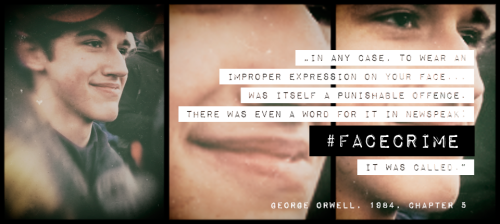It was terribly dangerous to let your thoughts wander when you were in any public place or within range of a telescreen. The smallest thing could give you away. A nervous tic, an unconscious look of anxiety, a habit of muttering to yourself – anything that carried with it the suggestion of abnormality, of having something to hide. In any case, to wear an improper expression on your face (to look incredulous when a victory was announced, for example) was itself a punishable offense. There was even a word for it in Newspeak: facecrime, it was called.
— 1984, G. Orwell
It’s been said before, but bears repeating. Leftoids read 1984 not as a warning, but as an instruction manual.

On-topic: The Surveillance State is alive and well and consuming our last liberties: “Is Big Tech merging with Big Brother? Kinda looks like it“.
A FRIEND OF mine, who runs a large television production company in the car-mad city of Los Angeles, recently noticed that his intern, an aspiring filmmaker from the People’s Republic of China, was walking to work.
WHEN HE OFFERED to arrange a swifter mode of transportation, she declined. When he asked why, she explained that she “needed the steps” on her Fitbit to sign in to her social media accounts. If she fell below the right number of steps, it would lower her health and fitness rating, which is part of her social rating, which is monitored by the government. A low social rating could prevent her from working or traveling abroad.
China’s social rating system, which was announced by the ruling Communist Party in 2014, will soon be a fact of life for many more Chinese.
[…]
Big Brother is an emerging reality in China. Yet in the West, at least, the threat of government surveillance systems being integrated with the existing corporate surveillance capacities of big-data companies like Facebook, Google, Microsoft, and Amazon into one gigantic all-seeing eye appears to trouble very few people—even as countries like Venezuela have been quick to copy the Chinese model.
Still, it can’t happen here, right? We are iPhone owners and Amazon Prime members, not vassals of a one-party state. We are canny consumers who know that Facebook is tracking our interactions and Google is selling us stuff.
Yet it seems to me there is little reason to imagine that the people who run large technology companies have any vested interest in allowing pre-digital folkways to interfere with their 21st-century engineering and business models, any more than 19th-century robber barons showed any particular regard for laws or people that got in the way of their railroads and steel trusts.
Survey after survey has shown that Americans — and Millennials in particular — are blasé about their privacy being stripped from them by a corporate-government behemoth harkening Big Brother from the dystopian novel 1984. I have heard a variation of “if you’re not doing anything wrong, what are you worried about?” more times than I can count.
I’m flabbergasted by this indifference to the existential threat posed by a Globohomo Surveillance State. But then, I’m reminded in so many ways that Millennials are by far the f@66iest generation in the history of the world, and I begin to understand how a soy-addled and rectum-invaded mind can rationalize its own docility.
[crypto-donation-box]
